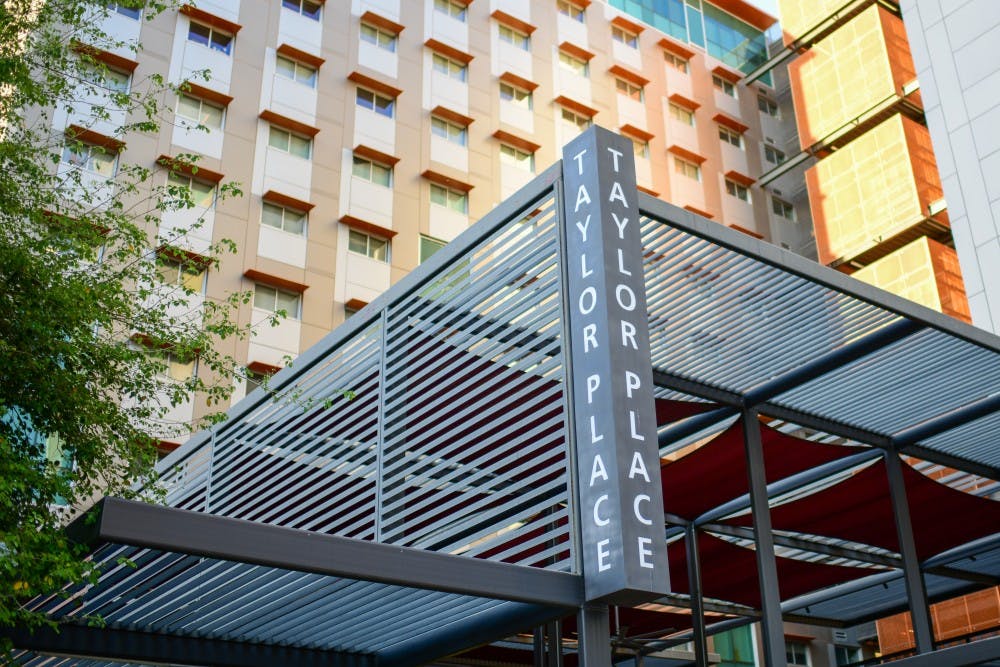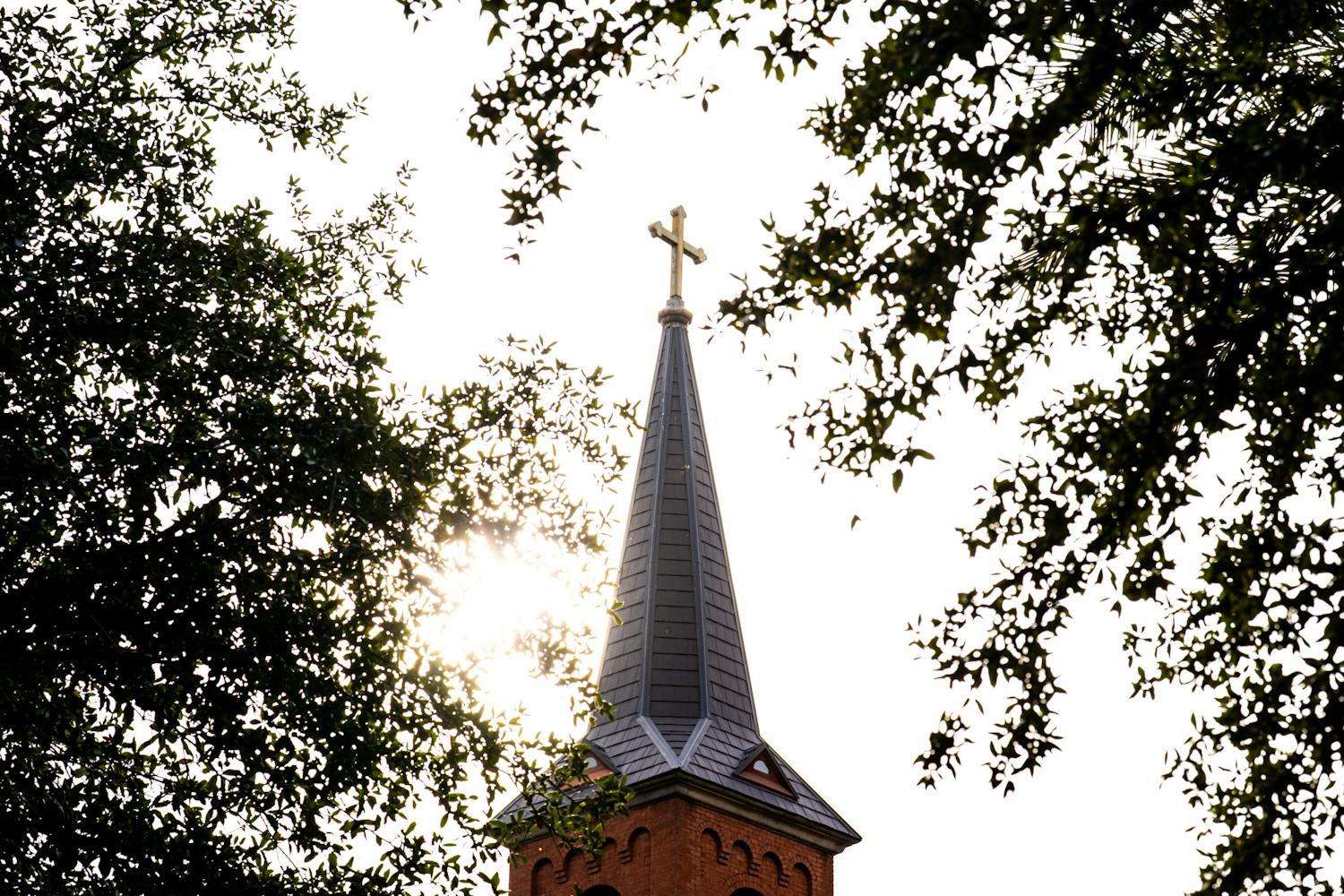Jacob Newberry was sitting in the Taylor Place dining hall eating a sandwich wrap when a man approached him and asked about his relationship with God.
Newberry, a nutrition freshman, said the individual asked him to fill out a survey about his religious beliefs. Newberry agreed, but as he filled the survey out, the questions became increasingly prodding.
“I wasn’t angry, but it felt deceptive,” said Newberry, who agreed to the survey, thinking it was for a school-related statistics project. It’s common in and around the dorm communities for students working on school projects to approach other students with surveys.
But this survey was very different.
After each round of questions he answered, the man asked Newberry to discuss his answers. When he finished the survey, which he said took him 15 to 20 minutes, the man said he was with a church called Cru and asked Newberry to attend the ministry’s bible study group.
“We couldn’t get out of it because we were sitting. We were also in the middle of a meal, so we couldn’t say, ‘no thank you,’ and walk away,” Newberry said.
Multiple students told State Press Magazine that several individuals and religious organizations have been intrusive in their faith-based outreach. Some of these forms of outreach, according to the dean of students, were against University housing policies.
Amelie Ho, a nursing freshman, and Monica Medina, a health solutions freshman, said they were also approached to take the survey.
“I thought it was just a yes or no survey, but it was more like: What are your beliefs with God? What is your relationship with God? Do you think you will go to heaven?” Medina said about filling out the survey in the dining hall.
“I felt very violated,” Ho said about the man approaching her in an area she considered safe. “They asked us five very personal questions. They wouldn’t let us opt out of it.”
Cru acknowledged that a member was asking students in the Taylor Place dining hall to fill out surveys about their religious beliefs, but a representative said surveying in dorm communities is not a typical recruitment strategy for the church.
However, Cru did not respond to comment on where the church member got the idea to survey students or what was done with the data the group collected. The student who was personally conducting the surveys in Taylor Place did not respond to comment either.
Dean of Students Joanne Vogel said this outreach strategy is also a violation of University housing policies. She said a survey about religious beliefs, like any survey, “would not be allowable in that space because it is not a public space.”
Kevin T. Schaudt, the Director of Operations on the downtown Phoenix campus, said he was not familiar with Cru’s outreach in the dining hall, but if he witnessed this taking place, he wouldn’t hesitate to kick the group out.
“I don’t think anyone that is sitting down to have a meal should be disrupted,” Schaudt said.
SPM’s reporting has found that intrusive religious surveying, canvassing and general outreach is a common occurrence at the downtown campus. Some of it is well-intended, and some canvassing doesn’t even break ASU policies, but students said they feel uncomfortable nonetheless.
Solicitation in the dorms
Every Tuesday night, a small group of students goes floor-to-floor in Taylor Place to ask students whether they need a prayer. On one occasion, they even handed out cookies.
They see their actions as a means of harmlessly spreading their faith; the problem is these students are breaking University housing policies, which explicitly prohibit surveying, canvassing and soliciting.
Some of the students are members of Antioch Student Ministries, an on-campus extension of Antioch Community Church in Chandler, Arizona. Though these students’ outreach methods are well-intended, some Taylor Place residents said being asked about prayer in a private dorm community made them uncomfortable.
Leah Smith, an exercise and wellness freshman, said she is one of the students who got a knock on her door, and she described the experience as uncomfortable.
“I’ve never had someone come up to me and ask if they can pray for me in a situation like this. So I didn’t really have a response other than to let them do it,” Smith said. “When someone comes up to you and asks to pray for you, they're stepping in on your life and (playing) a part they may not have a place to.”
While some students find the floor-to-floor solicitation unnerving, those behind the group don’t view it in the same light.
“I’ve seen the power of prayer change lives, even in my own life,” said Mason Larson, a freshman journalism student and one of the students asking for prayer requests in Taylor Place. “I have a big heart for people, and I know that people need it. So we love to give that as an opportunity or an option for people.”
Larson said he got involved with Antioch during the first week of college after his brother referred him to the church. After experiencing one of the church’s services, Larson immediately knew he wanted to become more involved.
Along with three other students, Larson started a student-led bible study group that meets every Tuesday. After bible study, he and a few other students go floor-to-floor in Taylor Place.
Going floor-to-floor isn’t easy for the group, according to Larson, who described these outreach tactics as “very hit or miss.”
Antioch Student Ministries Campus Pastor Christian Shappee, who has a seat on the Council of Religious Advisors, said he was unaware that students were technically breaking ASU housing policy guidelines.
“Everything we try to do, we want to be upright and completely honest in the eyes of the University,” Shappee said. “I’m not controlling what my students do in their personal time.”
Larson echoed Shappee’s sentiment, saying his and other students’ choice to go floor-to-floor in Taylor Place was not endorsed by Shappee or other Antioch leadership, despite being organized by Antioch members and immediately following the group’s weekly bible study.
This leads to the question of whether Shappee or Antioch would be held responsible for campus policy infractions by the church’s members.
Vogel said the answer to that question is complex.
“We look very closely at certain circumstances,” Vogel said. She said policy violations by organizations and individuals are treated differently by the Dean of Students Office.
When it comes to individuals who also happen to be a part of a larger organization, Vogel said, “We may also look and say, ‘OK, well is there more pervasive pattern within the organization?’”
Aggressive outreach by a non-affiliate
According to student accounts, the recruitment methods used by Hope Church, an off-campus ministry, have also caused an unnerving sense among some students on campus.
While students have said the church’s presence makes them uncomfortable, Hope’s outreach is not breaking any campus policies.
Many students said they received insistent text messages and calls from church members, in addition to being approached frequently on campus.
In August 2017, Hope Church was expelled from ASU’s CORA after State Press and University investigations found that the church violated ASU policies. The church was reportedly found engaging in hazing activities that caused “acts of mental harm, personal degradation and embarrassment,” according to a State Press report.
Read more: ASU investigation finds Hope Church violated multiple conduct policies
The Arizona Republic reported that the University also found a policy violation in Hope’s early semester recruitment drive, called “Operation 72.” The method is used to recruit new members of the church within the first 72 hours of freshmen being on campus. Hope Church leaders would allegedly approach students within the dorm community, without authorization, and ask students to attend events.
Although Hope was sanctioned by the University and removed from CORA, students said the church’s outreach is still pervasive on campus, and five students told State Press Magazine that they feel Hope’s methods border on harassment.
“I see them everywhere … I feel like I’m being followed,” said exercise and wellness freshman Brooklin Yearwood, a former member of Hope Church, who was turned off by the number of times the church contacted her. She said this was the primary reason she left the church in the first place.
“(Hope Church) is always on campus. When I was a member of their church, I would sometimes lie and tell them I was busy, because I didn’t wanna go to something,” Yearwood said. “I’d be walking down the street with friends and see them. It’s really creepy ... like I can’t get away.”
Students interviewed showed SPM texts sent by Hope Church, some sent every day asking students to make Ulta and Target runs with them or to grab a bite to eat.
“They text, they call, they snapchat, they follow you on social media, they don’t stop,” said a student who formerly attended Hope Church, and prefers to remain anonymous out of fear of continued harassment from the church.
The student attended one of the church's events called Survivor Weekend and quickly found the church wasn’t for them. “I’m not religious, and I don’t wanna say they force it on you, but they force it on you.”
In response to students feeling uneasy by the persistent efforts of recruiters, the church issued a written statement to State Press Magazine.
“We are active in outreach. Student outreach is a normal part of any healthy Christian campus ministry, and our desire is to build positive, appropriate relationships with students as we meet them. As for students who feel uneasy about our outreach, we are always open to hear from someone if they have had less than a positive experience with our church,” the Church wrote in a statement.
On the other hand, some students said Hope’s recruitment tactics did not bother them. Daisy Hanks, a nursing sophomore, said she understands why Hope Church actively recruits on campus.
“I think that they were a little bit pushy, but as far as just trying to talk to people … If they came up to me and I didn’t know them, I ultimately make the decision to talk to them,” Hanks said. “So I understand why they’re on campus. They’re trying to spread the word about the church, but also, to try to save people.”
Students claim outreach methods used by these three religious organizations make them feel uncomfortable and, in some cases, harassed. Some of the organizations’ practices violate University housing policies.
But even in instances that do fall within the bounds of campus policies, many students still feel harassed or uncomfortable.
“I see them all the time at places I shouldn’t feel uncomfortable,” Yearwood said of Hope Church. “They don’t live here. They have no reason to be here.”
Reach the reporter at myarmusg@asu.edu and follow @gannonmikenna on Twitter.
Like The State Press on Facebook and follow @statepressmag on Twitter.




